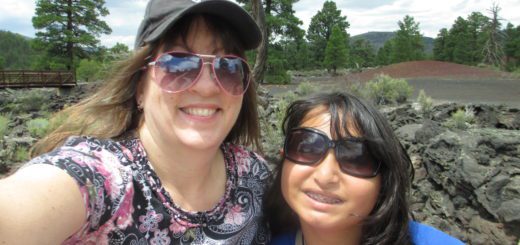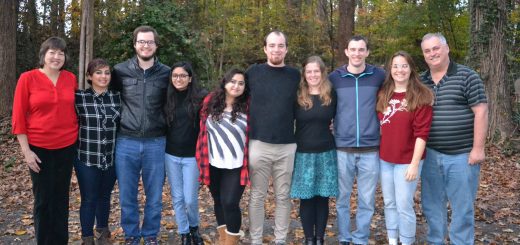Discernment: Recognizing and Responding to the Presence of God
Last week, Nancy Penton talked with us about the spiritual practice of examen, which is like viewing game films. We can reflect back and notice where we have seen the presence and activity of God in our lives, deepening our self-awareness through self-examination. As we gain more experience, we begin to notice other dynamics that help us discern the presence of God so that we can be more fully aligned with God’s purposes day by day, even moment by moment. We can pay attention to the times when the Holy Spirit energizes us, and we can notice times when we feel drained of life in some way. This noticing is part of what we call discernment, which is our topic today from Ruth Haley Barton’s book, “Sacred Rhythms”: Discernment – Recognizing and responding to the presence of God.
The dictionary defines discernment as:
- acuteness of judgment and understanding
- keen perception
- perspicacity (related to Perspex, vision, light), penetration, insight
This last definition comes close to what we’re talking about in our context. Ruth Haley Barton notes that discernment is a spiritual discipline, and a mark of maturity, and listed in the Bible as a spiritual gift. But first of all it is a habit, a way of seeing that can eventually permeate our whole life. Discernment is the journey from spiritual blindness (not seeing God anywhere or seeing him only where we expect to see him) to spiritual sight (finding God everywhere, especially where we least expect it).
Isaiah 45:15 (NASB) – “Truly, You are a God who hides Himself, O God of Israel, Savior!”
Psalm 139:11-12 (NLT) – “I could ask the darkness to hide me and the light around me to become night—but even in darkness I cannot hide from you. To you the night shines as bright as day. Darkness and light are the same to you.”
Ignatius of Loyola, the founder of the Jesuits (who are well known for their spiritual exercises designed to hone one’s capacity for discernment), defined the aim of discernment as “finding God in all things in order that we might love and serve God in all.”
The habit of discernment is a quality of attentiveness to God. Speaking of himself, Jesus said in John 5:19 (NLT) – “I tell you the truth, the Son can do nothing by himself. He does only what he sees the Father doing. Whatever the Father does, the Son also does.”
What does it mean to be attentive? to be attentive to God?
[Being attentive to God includes noticing not only what He is saying, but how He is saying it. Because God is infinite, there is always something about Him that we haven’t yet seen, understood, or received. Jesus said a couple of verses earlier in John 5:17 (NIV) – “My Father is always working, and so am I.” We can also attend to where He is working, what He’s doing. We can attend to who we are when we are most authentic. I like to use the terminology of being present, since the present moment is the most authentic time in which we can live. When I am most authentic, I am being present to myself, to God, and to others. Being fully attentive to God is part of fully giving ourselves to Him. Ruth Haley Barton likens it to the experience of floating down a river, where sometimes we might serenely allow the current to carry us along, and other times we might be running rapids and need to be fully alert in order to ride the waves to our destination without being overpowered by their force. Either way, we are not in charge of the direction or the speed, but we notice what they are and do what we can do in order to let the water carry us. In the same way, discernment is noticing what God is doing and letting Him take us where He wants to in the manner and timing of His choosing.]
Nancy mentioned in her class last week the ideas of consolation and desolation. In consolation, our lives are characterized by agape love, peace and joy. It’s that sense that no matter what is happening externally, I am free to be given over to God and to love even in times of pain or crisis. In desolation, our lives are characterized by dis-ease, turmoil, confusion, and possibly rebellion. Desolation is the loss of a sense of God’s presence, so we feel out of touch with God, others, or our most authentic selves. But even though consolation and desolation are not hard to understand, they can be hard to detect. But we can grow in our attentiveness and listen for what they have to tell us about God or ourselves. Each day brings consolation and desolation. Paying attention to what’s going on in our inner selves helps us to be more vigilant to choose life more consistently.
John 10:10b (NLT) – “My purpose is to give them a rich and satisfying life.”
There are so many good options before us each day. Jesus said His purpose is to give us a rich and satisfying life, a full life, an abundant life. Certainly there are some very clear-cut decisions between right and wrong, good and evil. But many other decisions require us to choose between two options that are both good. It is important for us to notice that which brings us a sense of life and freedom to our most authentic self in God.
Deuteronomy 30:19 – 20a (NLT) – “Oh, that you would choose life, so that you and your descendants might live! You can make this choice by loving the Lord your God, obeying him, and committing yourself firmly to him. This is the key to your life.”
What does it mean to choose life?
[God tells us in this verse how to choose life – by loving Him, obeying Him, and committing ourselves firmly to Him. Choosing life happens one choice at a time, one thought at a time, taking every thought captive in obedience to Christ. As we make it a habit to notice and respond to that which gives us life, we become more in touch with that which is truest about God, ourselves, and the world, so that we can make life-giving choices. It’s all about aligning ourselves more completely with what God is doing in any given moment.]
Proverbs 29:18 (The Message) – “If people can’t see what God is doing, they stumble all over themselves; but when they attend to what he reveals, they are most blessed.”
Discernment as a spiritual practice
Discernment as a spiritual practice is, in short, making ourselves available for what only God can give. The first thing we need to realize and accept is that there are no formulas, no methods that will automatically guarantee us discernment. But we can find ways to open ourselves to it. There are ways to be with a decision in the presence of God, and allow Him to guide our knowing. It starts with friendship with God, intimacy with Him. We can cultivate that by all manner of spiritual practices, some of which we’ve talked about in this series – being still in His presence and knowing that He is God, through meditating on Scripture, through listening to His voice in prayer, through what Ruth Haley Barton calls “alert awareness.”
There are three primary building blocks of belief in the process of discernment, without which we may not be open to what God is saying.
1. God is good
Easy to say, harder to believe in the fullest sense of the word! The English word “good” actually has its origins in the word “God!” God is good! It’s sometimes easier to believe that God is good in a general sense, but more challenging when we consider our own personal situation – we can ask ourselves, “Do I believe that God is good to me?”, “If I trust myself to the Lord, will I wind up where I least want to be?, “If I surrender to Him, will He withhold what I want the most?” Our author mentions Lucy in the Peanuts comic strip – again and again she pulls the football away just as Charlie Brown gives himself completely to the kick, so he falls flat on his face. If we believe there’s a catch to God’s goodness, or that He’s partly or even mostly good, or that He uses His power for anything other than good, then we will hold back in some way from being fully open to knowing what His will is for us.
2. Love is our primary calling
Our tendency might be to think decisions have to do with details, e.g. “Where should I live?”, “Whom should I marry?”, “What job should I apply for / take?”, “What’s my next step after high school?”, “Which church should I attend?”, and these are all important questions. But as Christ-followers, the choices we make always center on LOVE. A great question to ask ourselves is, “Which choice enables me to keep following God into love?” Most decisions are complicated and have other factors to consider, but the deepest question in any situation is WWLD – “What would love do?” This can be annoying at times, because love tends to be costly, inconvenient, inefficient, complicated, challenging, sacrificial, painful, risky, comes with no guarantees, and makes us vulnerable. But God is love. Love is the deepest calling of the Christian life. Any decision-making process that omits to consider what love would do misses the point of the Christian practice of discernment. Discernment is intended to take us deeper and deeper into the God’s heart and will, to follow God passionately into love, even if it takes us all the way to the cross.
3. The Holy Spirit is given to help us personally answer the call to love
Jesus said in John 14:26 (NIV) that, “the Advocate, the Holy Spirit, whom the Father will send in my name, will teach you all things and will remind you of everything I have said to you.”
What does the Holy Spirit do for us?
[The Holy Spirit takes what Jesus taught right into the present moment we are in. He helps us answer the call of love in ways that are consistent with who God made us to be in our personality, gifts, and calling. He calls us to live love in the context of our own destiny as freely, authentically, and wholeheartedly as Jesus Christ did. The practice of discernment includes the belief that in addition to God having already revealed His general will, He continues to reveal His personal will for us as it is needed and as we are able to both hear and respond to it.]
Discernment prayer # 1 – Prayer for indifference
Last week a friend shared an “aha” that the Lord had showed her – three simple words – “Nothing else matters!” This is very applicable to our study today. We can cultivate and pray for an attitude of holy indifference in this matter – indifference towards anything except God’s will. In other words, instead of predetermining what we think God would want in any given situation, we can present ourselves to Him wide open, relinquishing our rights, our reputation, our preferences, our plans, our cravings, our comfort, our benefits, our brokenness, our failures, our future, our present, our past, our assets, our agendas, our very selves. This is probably the most difficult part of the discernment process. Until we come to a place of indifference, then our prayers for guidance will resemble a rigged election. The fact that numerous watchdog organizations exist to monitor so-called democratic elections attests to the fact that we humans have a tendency to control outcomes in our lives!
Luke 1:38 (NIV) – “‘I am the Lord’s servant,’ Mary answered. ‘May your word to me be fulfilled.’”
When we’re facing a decision that is way off in the future, we can more easily say this. But the challenge comes when we’re facing something imminent, or where the outcome is really important to us, or where we have a vested interest. The bottom line is that we can only do what we can do – we can’t control anything really, even though we like to try. We can pray, and we can wait. We can ask ourselves, “What needs to die in me in order for God’s will to come forth in my life?” and “Is there anything I need to set aside so that I can be open to what God wants?”
Discernment prayer # 2 – Prayer for wisdom
James 1:5-6a (NLT) – “If you need wisdom, ask our generous God, and he will give it to you. He will not rebuke you for asking. But when you ask him, be sure that your faith is in God alone.”
When we have come to the place of indifference, where “nothing else matters,” when we have died to our need to be wise in others’ eyes or to prove ourselves according to human standards, we are finally ready to ask for God’s wisdom and receive it.
In summary, in order to practice spiritual discernment, we want to cultivate a lifestyle of noticing what’s going on, especially inside of ourselves.
S. D. = Spiritual Discernment = Slow Down + See Diligently + Sense Desires + Survey Depths
A key here is to proceed slowly and allow time and space to hear the Lord speak to us. Proceeding slowly also gives us time to notice whether heading towards a particular decision gives us a sense of life. If we sense peace, it’s important to notice whether it’s our ego at peace because our ego is still in control; or the fearful part inside us is at peace because we’re choosing a safe and secure path; or if the deepest, truest part of me is at peace because I have given everything over to God willingly and completely. If we are at peace in the core of our being, then we can take on courage and go forward. Discernment is a risky business, but we know that God is with us, He will never leave or forsake us, He is pleased with our desire to please Him, and He will help us in every way.
Discernment is about falling in love with God, so deeply in love that “nothing else matters,” and letting that decide everything.
Helpful reflection questions:
- How does this choice fit with the overall direction and calling of God on my life?
- Is there one word that captures my sense of calling these days?
- Does the current choice enable me to continue living into my calling?
- Which choice brings the deepest of life, inner peace and freedom?
- Is there a growing sense of wholeness, authenticity, congruence with who I am in God?
- Might this decision draw me away from God?
- Is there a particular Scripture that God is bringing to me relative to this choice? What is it saying to me?
- Is this choice consistent with what I know of the mind and heart of Christ and His redemptive purposes in the world?
- How will this direction nurture the fruit of the Spirit in me – particularly the fruit of love?
- What does love call for?
- What is God doing in my character and spiritual growth?
- Will this choice continue to nurture spiritual growth in me?
- Does this choice reflect the value of what is eternal, permanent, and of the deepest value (rather than what is transient and impermanent)?
- On my deathbed, what choice would I wish I had made?
- How does this choice fit with others’ observations of who I am and what God is doing in my life?
- Am I willing to open up every facet of this decision to a trusted spiritual friend for their wisdom and insight?
- Is there anything in the broad tradition of the Christian faith that might inform my decision?




